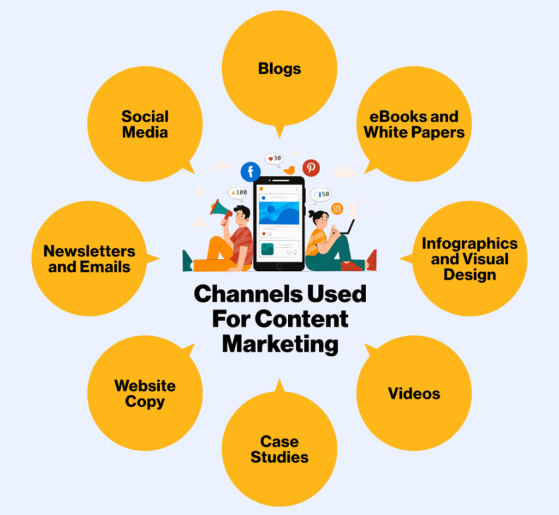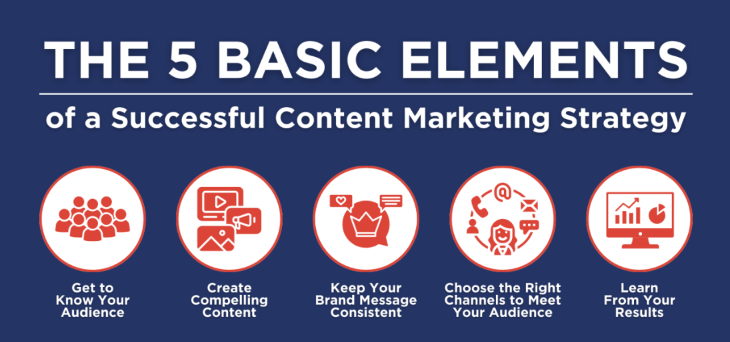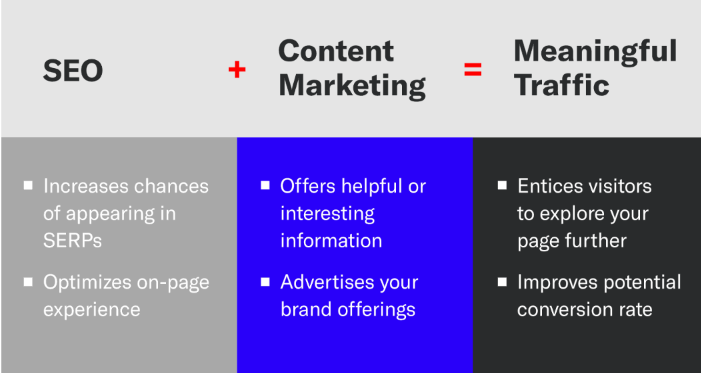Introduction

In a world where consumers are bombarded with a constant stream of information, standing out has never been more critical. The emergence of digital platforms has created an environment where brands must not only engage their audience but also foster genuine connections through relevant and meaningful content. This is where content marketing comes into play, a powerful strategy that enables brands to build their identity and garner customer loyalty. A well-executed content marketing approach can revolutionize the way a business communicates with its audience, ultimately transforming perception and driving growth.
Content marketing is not merely about creating a plethora of articles, videos, or social media posts; it focuses on delivering value that resonates with target audiences. By addressing consumers’ needs and interests, brands can create a cohesive narrative that bolsters engagement. This strategy has become vital in today’s digital landscape, where consumers seek authenticity and relevance. Businesses that adopt effective content strategies not only enhance their online visibility but also establish themselves as thought leaders in their respective industries.
Moreover, content marketing offers brands the unique opportunity to showcase their personality, values, and expertise. In doing so, they can evoke emotions that prompt consumers to take action, whether that be to engage with the brand, make a purchase, or share content with their network. As the digital landscape continues to evolve, the importance of cultivating a robust online presence through valuable content cannot be overstated. It is imperative for brands to understand not only how to create content but also how to strategically disseminate it to maximize reach and impact.
Understanding Content Marketing
Content marketing is a strategic approach focused on creating and distributing valuable, relevant, and consistent content to attract and engage a clearly defined audience. Unlike traditional marketing, which often prioritizes direct promotion, content marketing seeks to build trust and establish authority by providing useful information or entertainment. This shift in focus characterizes the role that content marketing plays within a broader marketing strategy, aligning with the goal of fostering long-term customer relationships rather than quick sales.

Various types of content can be harnessed within a content marketing strategy, including blogs, videos, infographics, and podcasts. Each format serves a distinct purpose, catering to different preferences within target audiences. For instance, blogs provide in-depth analysis and insights, helping to position a brand as a thought leader. Meanwhile, videos can convey complex messages quickly and engage viewers visually. Infographics, on the other hand, distill information into accessible visual formats, making data and concepts easier to understand and share. This diverse array of content types enhances brand awareness and promotes consumer engagement, as they can be tailored to meet the needs of different segments of the audience.
Furthermore, content marketing differentiates itself through its emphasis on delivering relevant and meaningful content to consumers. While traditional marketing campaigns may rely heavily on advertisements and promotional messages, which can often be perceived as intrusive, content marketing fosters a more organic connection with potential customers. By addressing their interests and addressing their pain points, brands can cultivate loyalty and trust, ultimately driving conversions. This aligns with the changing consumer landscape, where audiences now seek authentic interactions and valuable experiences from the brands they engage with.
Key Components of a Successful Content Marketing Strategy
A successful content marketing strategy is built upon several key components that work synergistically to achieve marketing objectives. One of the foundational elements is defining target audiences. Understanding who your audience is, their preferences, and their pain points allows for the creation of tailored content that resonates with them. For instance, a company that sells athletic wear may target fitness enthusiasts, tailoring content that speaks directly to this demographic’s interests, such as workout tips and product recommendations.

Another essential component is setting clear objectives. These objectives should be specific, measurable, achievable, relevant, and time-bound (SMART). By outlining what success looks like—whether it’s increasing website traffic, generating leads, or boosting social media engagement—marketers can create more focused content that drives the desired results. For example, if the objective is to increase newsletter sign-ups, content could include engaging articles coupled with a call to action that encourages readers to subscribe.
Creating a content calendar is also vital for managing and organizing content efforts. A well-structured calendar helps in plotting out when and where content will be published, ensuring that there is a consistent flow of information that keeps the audience engaged. For example, a brand might use the calendar to schedule blog posts, social media updates, and email newsletters, allowing for a synchronized marketing approach.
Finally, selecting appropriate content formats is crucial in reaching and engaging audiences effectively. Different formats, such as blogs, videos, infographics, and podcasts, cater to varying preferences and consumption habits. A tech company, for instance, may find success in utilizing video tutorials to demonstrate product features, while an e-commerce store might benefit from engaging blog posts that include product comparisons.
The Role of SEO in Content Marketing
Search Engine Optimization (SEO) plays a pivotal role in content marketing, as it directly affects the visibility and reach of digital content. By optimizing content for search engines, businesses can enhance their online presence, improving organic traffic and audience engagement. The integration of effective SEO strategies is crucial for content creators aiming to connect with their target audience and achieve marketing goals.

One of the fundamental practices in SEO is keyword research, which involves identifying the search terms that potential customers use when looking for relevant information. By focusing on these keywords, content marketers can tailor their content to address users’ specific needs and queries, ensuring that it appears prominently in search results. Utilizing tools such as Google Keyword Planner and SEMrush can assist marketers in uncovering high-traffic keywords and understanding search intent.
On-page SEO best practices are another vital aspect of this relationship. This includes optimizing several elements of the content, such as title tags, meta descriptions, headers, and image alt attributes, to align with the targeted keywords. Moreover, crafting well-structured content that incorporates these keywords naturally enhances readability and user experience, which search engines favor when ranking pages.
Additionally, linking strategies significantly contribute to the overall SEO efficacy of a content marketing campaign. By incorporating internal links, marketers can guide readers to related content on their website, improving site navigation and reducing bounce rates. Furthermore, earning backlinks from reputable websites bolsters credibility and can lead to higher search rankings. Together, these strategies create a robust framework for enhancing content performance and establishing a strong brand presence in the digital landscape.
Leveraging Social Media for Content Distribution
In today’s digital landscape, leveraging social media for content distribution has become crucial for brands aiming to amplify their reach and engagement. Due to the vast number of users on platforms such as Facebook, Instagram, Twitter, and LinkedIn, these channels serve as powerful tools for sharing content with a targeted audience. To begin with, creating shareable content should be a priority. Content that resonates with viewers, whether through humor, emotion, or originality, is more likely to be shared. Use compelling visuals, catchy headlines, and concise messaging to capture attention and encourage sharing. Tools like infographics, videos, and interactive posts tend to perform particularly well across various platforms.
Additionally, partnering with social media influencers can significantly enhance content distribution efforts. Influencers possess established trust and credibility with their followers, allowing your content to reach potential customers who may not be familiar with your brand. Identifying influencers who align with your brand values and audience is essential. Collaborating on content such as co-branded posts or sponsored content can lead to greater visibility and engagement, resulting in increased brand awareness.
Furthermore, measuring engagement metrics is vital for understanding the effectiveness of your social media content distribution efforts. Metrics such as shares, likes, comments, and click-through rates provide actionable insights into what resonates with your audience. Regularly analyzing these metrics enables you to tweak your strategies, optimizing your content for better performance. This evaluation should also include gathering audience feedback, as it can illuminate areas for improvement. By actively listening to your audience and adapting your content strategy, you can enhance future content distribution on social media, ensuring it remains relevant and appealing.
Measuring the Success of Your Content Marketing Efforts
Evaluating the effectiveness of content marketing initiatives is crucial for fine-tuning strategies and maximizing return on investment (ROI). Various metrics serve as key performance indicators (KPIs) that offer insights into how well your content is performing. Firstly, website traffic quantifies the number of visits to your content. Tools like Google Analytics can provide comprehensive data on unique visitors, page views, and session duration—indicators that help gauge user interest and engagement.
Engagement rates are another vital metric in assessing content success. These rates include likes, shares, comments, and time spent on page, which are indicative of how well your messaging resonates with the audience. Higher engagement typically suggests that the content is relatable and valuable, prompting readers to interact with it. Analyzing these rates can help identify which topics or formats perform best, enabling a more tailored approach for future content creation.
Conversion rates, which measure the percentage of visitors who complete a desired action (such as signing up for a newsletter or making a purchase), are integral to understanding the effectiveness of your content marketing. By setting clear goals and tracking these conversions, marketers can better align content with business objectives. Tools such as HubSpot and Kissmetrics can facilitate this tracking, offering detailed insights into user behavior following content consumption.
Finally, the total number of leads generated from content marketing efforts is an essential metric. This involves tracking contacts obtained through calls-to-action (CTAs) within your content. By analyzing leads, businesses can strategize on how to enhance lead generation tactics effectively. Overall, employing these metrics and continuously adjusting strategies based on analytics data is key to ensuring that content marketing efforts yield positive results and contribute to long-term brand growth.
Building Brand Loyalty Through Content Marketing
Content marketing has emerged as a pivotal strategy for fostering brand loyalty and trust among consumers. By consistently delivering valuable and relevant information, brands can effectively engage audiences and create strong emotional connections. In this context, building a consistent brand voice is crucial. A clear and recognizable tone helps establish identity, making it easier for consumers to relate to the brand on a personal level. This consistent voice should reflect the brand’s core values while appealing to the needs and aspirations of the target audience.
Crafting compelling narratives is another key technique that significantly impacts brand loyalty. Storytelling allows brands to share their journeys, engage audiences emotionally, and demonstrate how their products or services can address consumers’ pain points. A well-told story can evoke empathy and resonate with consumers, making them more likely to remember the brand. Additionally, incorporating user-generated content can enhance authenticity, as consumers appreciate hearing from their peers about real experiences with the brand. This strategy not only strengthens communication but also fosters a community around the brand.
Successful brands have exemplified how content marketing can create lasting connections with customers. For instance, companies like Airbnb and Red Bull have effectively utilized content to solidify their brand identity. Airbnb’s “Belong Anywhere” campaign emphasizes community and connection, positioning the company as more than just a travel service. Likewise, Red Bull has established itself as a lifestyle brand through its adventure-driven content that contributes to strong customer loyalty. These case studies illustrate that when brands prioritize content that resonates deeply with their audiences, they establish long-term relationships marked by loyalty and trust.
Continuous Improvement: Adapting Your Content Strategy
In the ever-evolving landscape of digital marketing, the necessity for continuous improvement in content strategies cannot be overstated. A successful content marketing approach not only engages audiences but also adapts based on real-time insights and feedback. Regular assessments are essential in this dynamic climate, as they provide valuable understanding of what resonates with your audience, allowing you to refine your content accordingly.
Gathering insights begins with analyzing audience feedback and performance metrics. Tools such as Google Analytics provide a plethora of data regarding how users interact with your content. Metrics such as bounce rate, time spent on page, and social shares can reveal what type of content is effective. Additionally, soliciting direct feedback through surveys or comment sections can yield qualitative insights, offering deeper perspectives on audience preferences and needs.
Staying ahead of industry trends is also crucial to refining your content marketing strategy. Engaging with thought leaders, subscribing to industry journals, and following relevant social media channels can equip you with knowledge about emerging topics and shifting behaviors among target audiences. Adapting your content to reflect these trends can enhance your brand’s relevancy and visibility.
Moreover, experimenting with new content formats can invigorate your strategy. Consider integrating various mediums such as video, infographics, or podcasts into your content mix to cater to different audience preferences. Trialing new ideas and assessing their performance opens avenues for innovation and engagement. It is also beneficial to implement an iterative process, where you continuously refine and optimize based on outcomes.
By prioritizing continuous improvement, businesses can cultivate a robust content marketing strategy that not only builds their brand but also fosters ongoing relationships with their audiences, ensuring long-term success in an increasingly competitive market.
Common Mistakes to Avoid in Content Marketing
In the rapidly evolving landscape of content marketing, brands often encounter a series of common pitfalls that can hinder their effectiveness. One significant mistake is neglecting audience research. Understanding the target audience’s preferences, needs, and behavior is crucial. Without this insight, content may fail to resonate, ultimately leading to poor engagement. Brands should invest time and resources in developing personas and gathering data to tailor their messaging accordingly.

Another frequent misstep is the inconsistency in content publishing. Regular and predictable content distribution helps to establish a brand presence and build a loyal audience. When content is sporadic, it can confuse readers and diminish trust. Establishing a content calendar can aid in planning and maintaining a steady flow of content. This methodology not only ensures consistency but also allows for strategic alignment with ongoing campaigns and events.
Ignoring SEO principles represents another critical error that can severely affect content visibility. Brands often create high-quality content but overlook optimization techniques, such as incorporating keywords that align with potential user queries. It is vital to conduct keyword research and understand the fundamentals of on-page SEO. This will enhance the chances of ranking higher in search engine results, driving more organic traffic.
Furthermore, many brands fail to evaluate the performance of their content. Without analytics, it becomes challenging to measure the effectiveness of content strategies. Implementing robust tracking mechanisms, such as Google Analytics, can provide insights into user behavior, engagement rates, and conversion metrics. This data is valuable for refining marketing approaches and ensuring that future content aligns with audience interests.
By being aware of these common mistakes in content marketing, brands can adopt more effective strategies, leading to a stronger brand presence and improved audience engagement.
Conclusion and Future of Content Marketing
In conclusion, the power of content marketing cannot be overstated. Through a well-structured and strategically executed content marketing strategy, brands can not only enhance their online presence but also build a robust identity that resonates with their target audience. Content marketing serves as a bridge between businesses and consumers, facilitating meaningful interactions and fostering lasting relationships. Notably, key takeaways from this discussion highlight the importance of understanding your audience, producing high-quality content, and leveraging various channels to disseminate information effectively.
As we look towards the future of content marketing, it is crucial to recognize the emerging trends that are shaping this dynamic field. With advancements in technology, such as artificial intelligence and machine learning, content personalization is becoming more sophisticated, enabling brands to cater to the specific needs and preferences of their consumers. Moreover, the rise of audio and video content, especially in the form of podcasts and live streams, is transforming how messages are conveyed to audiences, providing new avenues for engagement and brand storytelling.
Additionally, the growing emphasis on sustainability and social responsibility is influencing content marketing strategies. Brands are increasingly expected to communicate their values and ethics transparently, making authenticity a cornerstone of successful campaigns. As consumer behavior continues to evolve, it is vital for marketers to remain adaptable and attentive to these shifts.
Ultimately, the future of content marketing lies in its ability to innovate and evolve. By staying informed about the latest trends and technologies, marketers can hone their skills and develop strategies that not only meet contemporary demands but also anticipate future consumer expectations. Embracing this journey will empower brands to thrive in an ever-changing landscape, ensuring that they remain relevant and engaging in the eyes of their customers.
